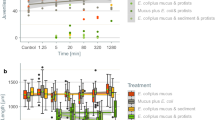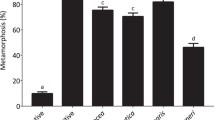Abstract
The serpulid polychaete Hydroides elegans Haswell, 1883 is an early colonist of new substrata in Pearl Harbor, Oahu, Hawaii. When metamorphically competent, larvae of H. elegans will settle rapidly upon an acceptably biofilmed surface, but not on a clean surface. In this study we found the ability of larvae to respond selectively to inductive surfaces to be retained for at least 3 wk. Of a series of bacterial strains isolated from Hawaiian marine biofilms, 13 induced larval settlement, 11 gave moderate or mixed results, and 10 others did not stimulate the settlement of H. elegans. The amount of settlement induced by monospecific strains was rarely as great as with natural, multispecies films. Most of the isolated bacteria were motile Gram-negative rods, but Gram-positive strains were also present, and diverse metabolic types were represented in the study. Biofilms killed by treatment with heat, ultraviolet radiation or chemical fixatives were no longer inductive. Soluble, dialyzable, heat-stable bacterial products induced settlement and metamorphosis more slowly. The range of bacteria producing an inductive signal suggests either that there are multiple cues, or that the cue is common to many bacteria. Chemical signals characteristic of early microbial biofilms may indicate freshly available substrata with optimal potential for the growth and survival of H. elegans.
Similar content being viewed by others
Author information
Authors and Affiliations
Additional information
Received: 30 January 1998 / Accepted: 12 September 1998
Rights and permissions
About this article
Cite this article
Unabia, C., Hadfield, M. Role of bacteria in larval settlement and metamorphosis of the polychaete Hydroides elegans. Marine Biology 133, 55–64 (1999). https://doi.org/10.1007/s002270050442
Issue Date:
DOI: https://doi.org/10.1007/s002270050442




